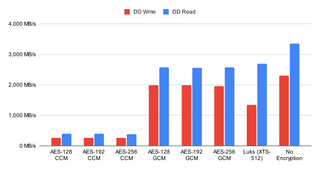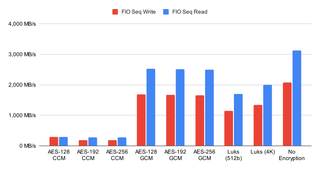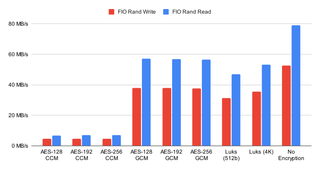ZFS Encryption Speed (Ubuntu 24.04)
Well, another Ubuntu version, another set of encryption performance tests. Here are the results for Ubuntu 24.04 on kernel 6.8 using ZFS 2.2.2. As I’m doing this for quite a few versions now, you can find older tests for Ubuntu 23.10, 23.04, 22.10, 22.04, 20.10, and 20.04.
Testing was done on a Framework laptop with an i5-1135G7 processor and 64GB of RAM. Once booted into installation media, I execute the script that creates a 42 GiB RAM disk that hosts all data for six 6 GiB files. Those files are then used in a RAIDZ2 configuration to create a ZFS pool. The process is repeated multiple times to test all different native ZFS encryption modes in addition to a LUKS-based test. This whole process is repeated again with AES disabled. As before, the test is a simple DD copy of 4 GB files; however, this time I included FIO tests for sequential and random read/write. One thing absent for the 24.04 round is a 2-core run. Relative performance between a 2-core and 4-core setup remained about the same over many years I’ve been doing this testing and thus it doesn’t really seem worth the effort.
Since I am testing on the same hardware as previously, I expected little to no difference in performance but I was pleasantly surprised as performance did significantly increase across the board by about 20%. Considering 23.10 decreased performance by 10%, it’s nice to see we have that performance recovered with a bit of improvement on top. If you need more disk performance out of your existing hardware, you should really consider upgrading to Ubuntu 24.04.
When it comes to the relative performance, nothing really changed. ZFS encryption is still more performant than LUKS on writes and LUKS exhibits slightly higher performance when it comes to reads. CCM modes are still atrocious but, if your processor doesn’t have AES support, might be useful.
As, going forward, I plan to use FIO instead of a simple dd copy, it’s as good time to analyze those numbers too. Unsurprisingly, the sequential performance numbers as compared to the simple DD copy are about the same. The only outlier seems to be read performance that drops a bit more than other readings. My best guess is that this is due to higher parallel IO demands FIO makes.
Since I am using FIO, I decided to add random I/O too. I expected results to be lower but numbers surprised me still. Write performance dropped to 50 MB/s without encryption. With encryption performance drops even further to 30 MB/s. Fortunately, real loads are not as unforgiving as FIO so you can expect much better performance in real-life.
In future, there are a few things I plan to change. First of all, I plan to switch onto using FIO instead of DD. While I will probably still collect DD data, it will just be there so one can compare it more easily to older tests and not as a main tool. Secondly, I plan to switch LUKS to 4K blocks and not bother measuring 512-byte sector size at all. Most of drives these days have 4K sectors and thus it makes sense that any proper LUKS installation would match that sector size. Making it default just makes sense. Performance-wise, they’re not a huge improvement but the do bring LUKS numbers closer to the native encryption.
PS: Raw data is available in Google Sheets.


